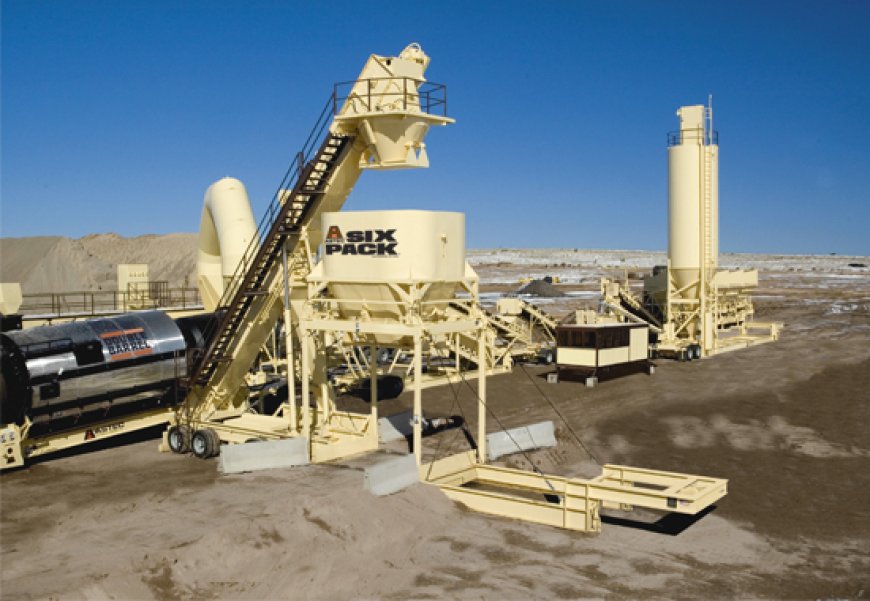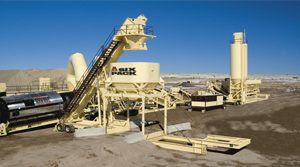We expect the demand for hot mix plants to increase significantly.
Raj Shrivastav, Executive in Charge Crushing Screening & HMAP- TIL. It is our constant endeavor to incorporate in our products the latest cutting-edge technology in order to offer long-term solutions and add value to customers’

 Raj Shrivastav,
Raj Shrivastav,
Executive in Charge
Crushing Screening & HMAP- TIL.
It is our constant endeavor to incorporate in our products the latest cutting-edge technology in order to offer long-term solutions and add value to customers’ operations.
TIL, under strategic alliance with Astec Inc., USA, offers a range of hot mix asphalt plants in India. Astec’s superior understanding of the requirements in this segment has enabled TIL to provide its customers world-class asphalt plants. “Our range of asphalt plants are equipped with a host of important technical features that improve efficiency, enhance productivity, help in conserving the environment, and also provide a significant advantage on total cost of ownership,” states Raj Shrivastav, Executive in Charge – Crushing, Screening & HMAP- TIL. In an exclusive chat with EQUIPMENT TIMES, Shrivastav throws light on the technological trends in asphalt plants and the importance of continuous drum mix technology in the Indian context.
It doesn’t matter whether the technology used is batch / continuous; inefficiencies can only pull the profitability down? What is your take on this with regard to Indian context?
 Efficiency and productivity are the primary parameters when it comes to the choice of asphalt plants. Over the last couple of decades, continuous drum mix technology has evolved in asphalt plants, with many countries preferring continuous drum mix plants over batch type plants, in view of the obvious benefits of quality of asphalt, competitive costs, lower energy requirement, lower operating costs, acceptable emission values, quick setup and dismantling time and portability. The world over, especially in North and South America, there had been a clear shift from batch plants to continuous plants during the phase of mega scale infrastructure projects. In practice, we do not see any real advantage of batch plants. In terms of energy efficiency, usage of aggregates and quality of asphalt produced, continuous plants have advantages over batch plants.
Efficiency and productivity are the primary parameters when it comes to the choice of asphalt plants. Over the last couple of decades, continuous drum mix technology has evolved in asphalt plants, with many countries preferring continuous drum mix plants over batch type plants, in view of the obvious benefits of quality of asphalt, competitive costs, lower energy requirement, lower operating costs, acceptable emission values, quick setup and dismantling time and portability. The world over, especially in North and South America, there had been a clear shift from batch plants to continuous plants during the phase of mega scale infrastructure projects. In practice, we do not see any real advantage of batch plants. In terms of energy efficiency, usage of aggregates and quality of asphalt produced, continuous plants have advantages over batch plants.
What are the advantages and scope for low energy /low temperature asphalt mix in the Indian scenario?
A rising trend is the use of reclaimed asphalt pavement (RAP) in asphalt mix to enable sustainable road construction, which is being encouraged by MoRTH, IRC, CRRI, NHAI and other agencies to reduce the carbon footprint of road construction. Use of RAP has been made mandatory by NHAI. Astec-TIL asphalt plants with double barrel technology are capable of using upto 50% RAP. The next big thing in India will be warm mix (WAM) produced with water foaming. It consumes at least 14% less energy, has better compaction and much longer resistance to fatigue (up to 13 times more) according to independent long term lab studies in USA and Europe.
What is the present scenario of using recycled aggregates and asphalt for road construction? What needs to be done to promote its use in order to preserve virgin resources?
Over the recent past, there has been a growing realization in India that asphalt roads, apart from being much cheaper to build, have significant merits as well. They offer softer and smoother rides, can be designed to carry heavy loads and are easily repairable. Today, several factors weigh in while deciding the type of road to be built. I am quite hopeful that going forward, we will see a major resurgence of asphalt roads in India. Globally, it is asphalt, not concrete, which is the material of choice for roads. In North America, asphalt roads are used also because asphalt can be recycled better than concrete. Furthermore, concrete roads are too expensive to build, take a longer time to build and are both difficult and expensive to maintain. A great way to ensure preservation of resources in the course of road construction is by way of ensuring greater energy efficiency of asphalt plants, i.e. minimum consumption of diesel, and encouraging usage of Reclaimed Asphalt Pavement (RAP). This trend of asphalt roads, along with the use of RAP, being preferred over concrete roads is bound to emerge in India, sooner rather than later.
What are the new technical features in your latest plants? How do these new technologies contribute to higher productivity and profitability?
TIL, under strategic alliance with Astec Inc., USA, offers a range of hot mix asphalt plants in India. Astec’s superior understanding of the requirements in this segment enables us to provide our customers with some world-class asphalt plants. Apart from being energy efficient, these plants can utilize upto 50% Recycled Asphalt Pavement (RAP). Faster setup, by virtue of their modular design, ensures higher uptime and availability of the plants. These plants can be towed away and installed at ease. Our range of asphalt plants are equipped with a host of important technical features that improve efficiency, enhance productivity, help in conserving the environment, and also provide a significant advantage on total cost of ownership, viz:
- Counter flow continuous technology for optimising fuel efficiency
- Option for multi-fuel burner
- Screw conveyors for returning fines collected in the bag house to the drum
- 100% portable plants for quick set-up and dismantling
- Aramid fibre baghouse filters to prevent dust emissions and protect the environment
- PLC-based controls for better plant operations
- Bigger surge bin for storage and discharge of mixed material with minimum segregation
- Latest generation of warm mix systems that simplify production of warm mix asphalt, achieving better foaming with less maintenance
It is our constant endeavor to incorporate in our products the latest cutting-edge technology in order to offer long-term solutions and add value to customers’ operations.
Can you substantiate the point that continuous drum mix plants are better off compared to batch type plants?
There is a perception that batch plants can accommodate inconsistent aggregate blends in the cold feed due to the screening operation that takes place at an intermittent point in the process.
This is not really so. In contrast, a continuous plant blends aggregates at the cold feed system as the controls ‘tell’ each cold feed bin feeder exactly how much aggregate is required to satisfy the mix design requirements. The blending at this point in the continuous plant process is very precise. Since consistent aggregates are required for both continuous and batch processes, the continuous plant becomes the plant of choice with respect to initial cost, operating cost, maintenance cost, portability, and RAP processing capabilities.
In a batch plant all ingredients are fed into a pugmill that could mix them for a shorter period depending on the operator. In contrast, in continuous drum mix technology, the predetermined mixing time cannot be adjusted by the operator, and every particle has sufficient time to be coated with bitumen. Sequential mixing in drum mix plants also makes it very easy to add different additives like fibers, chemicals, etc., and incorporate them into the mix properly and homogeneously.
In conclusion, we believe that batch plants offer no real advantage in the quality, size or gradation of asphalt. The purported advantages of batch plants are also not substantiated by any conclusive and comparative data from independent sources.
What are the benefits of warm mix asphalt?
The Astec-TIL range of asphalt plants produce warm mix asphalt, the benefits of which are well known in the asphalt paving industry, viz. reduced energy consumption, lower emissions and elimination of visible smoke. Features like highly efficient burners and baghouse filters in counter-flow systems, and large sized knockout boxes and cyclones in parallel flow systems, contribute towards effective pollution control. Astec is one of the very few brands that are allowed in places like California or Northern European countries, which have very stringent environmental regulations, and even near or within highly populated areas.
How do you assess the growth opportunities for hot mix plants in India? How geared up TIL is meet the expected surge in demand?
India needs to address the huge infrastructure deficit that has existed since independence. Earlier, policy makers favoured concrete roads because the longevity of concrete roads was assumed / expected to be high. However, there seems to be a realization that asphalt roads are equally good and more eco-friendly. Apart from more national
highways under the Bharatmala program, the demand for all-weather roads for better port-hinterland connectivity, as well for linking
them with major highways, border roads, coastal roads, etc., will drive the demand for asphalt plants. Further, big ticket projects in new airport construction and modernization of some others, which will involve a substantial outlay on asphalt roads. Consequently, we expect the demand for Hot Mix Plants to increase significantly.
TIL is well positioned to take advantage of this growth opportunity. TIL – in alliance with Astec – offers plants with significantly superior features – greater energy efficiency,less wastage, automation (without manual intervention), rapid deployability, environment-friendliness, high use of RAP and lower cost of operations. These benefits are recognized by customers and we see a strong improvement in our business in the coming years.
What are the key market trends in asphalt plants in terms of current and expected demand from NHAI and State Highway and Rural road projects? What capacity plants are in demand for these projects?
With new highway projects by NHAI and rural road projects being undertaken on a massive scale, the infrastructure sector is rapidly gaining traction after a slowdown. The government’s new policy initiatives and support have fueled the positive trends in this sector.
Asphalt plant manufacturers are expected to witness a surge in demand for their products. We see an increase in the demand for 120, 200 and 300 TPH asphalt plants. Currently, the key market trends indicate the use of batch mix plants and continuous drum mix plants for certain applications, growing usage of Reclaimed Asphalt Pavement (RAP) and the use of Continuous Double Barrel Plants where RAP
is used.
Hits: 323








